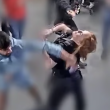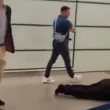Netflix’s ‘Who Killed Jill Dando?’ Explores the Mysterious Murder of a Prominent Journalist.
Netflix’s latest three-part investigative documentary series, “Who Killed Jill Dando?” dives deep into one of the UK’s most puzzling and high-profile unsolved murders, without marking a particular anniversary or revealing any fresh information. The series, produced with the endorsement of Nigel Dando, Jill’s sibling, intends to perhaps reignite public interest, hoping for the emergence of fresh leads or evidence.
Jill Dando, a renowned television journalist, met her tragic end on 26th April 1999, when she was brutally shot at her Fulham residence’s front door during the day. The nature of her murder was strikingly unexpected given the rarity of such violent crimes in the UK, especially in the affluent neighbourhood of Fulham. Furthermore, crimes involving female victims targeted by unknown assailants remain a rare occurrence. The sudden demise of such a well-loved figure without any discernible motive has baffled many.
The meticulously crafted documentary chronicles Jill’s life journey, starting from her cherished memories of her upbringing in Weston-super-Mare, Somerset. Recollections from her brother, Nigel, include moments like their beach outings. The narrative moves through her formative years in journalism, her transition to television, and her illustrious career as a news anchor and presenter for popular shows like “Holiday” and “Crimewatch”. The series, however, paints a bleak picture of the subsequent police probe, hindered by the lack of eyewitnesses and overwhelmed by an influx of unhelpful tips from well-meaning citizens.
An intriguing episode involves “Mr James”, who, following a Crimewatch reconstruction of the murder, alleged that a drug cartel had targeted Dando. Upon closer examination, this turned out to be an attempt to mislead the investigators.
The documentary offers keen insights into the media’s influential role in moulding public perceptions about the case, touching upon not just journalistic aspects but also the impact of dramatic portrayals on public expectations.
The series takes a detour to chronicle the arrest and subsequent conviction of Barry George, a local with a chequered past. While initial findings pointed towards his possible involvement, a later review deemed some evidence as questionable. This led to a retrial wherein George was acquitted. The documentary features an interview with George and his sister, who played a pivotal role in his acquittal.
Theories abound regarding the identity of the killer: from a Serbian hitman seeking revenge for Jill’s humanitarian appeals for Kosovan refugees to the possibility of a disgruntled stalker. In a dramatic twist, Noel “Razor” Smith, a former criminal now turned author, posits that whispers within the criminal underworld might hold clues to the killer’s identity. However, he stops short of naming anyone, citing personal safety concerns.
As the documentary draws to a close, Nigel Dando’s quest for answers and justice for his sister continues, capturing the nation’s enduring intrigue and hope for a resolution.






